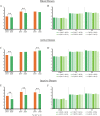The impact of COVID-19 on blood donations
- PMID: 35324952
- PMCID: PMC8946670
- DOI: 10.1371/journal.pone.0265171
The impact of COVID-19 on blood donations
Abstract
During a crisis, society calls for individuals to take prosocial actions that promote crisis management. Indeed, individuals show higher willingness to help after a disaster. However, the COVID-19 pandemic presents significant differences as it is an ongoing crisis that affects all individuals and has the potential to pose a direct health threat to anyone. Therefore, we propose that the pandemic may also negatively affect willingness to help, specifically blood donation intentions. It requires a high level of willingness to donate blood beyond the crisis outbreak, as more blood will be needed when postponed surgeries resume. When comparing blood donation intentions from a pre-pandemic study to results from a six-wave (bi-weekly) panel study conducted in Germany during the first pandemic phase (April to June 2020), we find lower medium and long-term blood donation intentions. While active donors show increased awareness of ability and eligibility to donate at the beginning of the pandemic compared to pre-pandemic, they feel significantly less able to donate as the pandemic progresses. Furthermore, inactive donors' perceived ability to donate significantly decreases in the pandemic phase compared to the pre-pandemic phase. Crucially, both active and inactive donors feel less responsible and less morally obliged to donate, resulting in an overall negative pandemic effect on blood donation intentions. The COVID-19 pandemic compromises blood donations endangering the life-saving blood supply. These alarming results offer evidence-based grounds for practical implications for driving donations in the event of a pandemic.
Conflict of interest statement
The authors have declared that no competing interests exist.
Figures


References
-
- Feeny S, Clarke M. What determines Australia’s response to emergencies and natural disasters? Aust Econ Rev. 2007;40(1): 24–36.
-
- Spekman MLC, Ramondt S, Quee FA, Prinsze FJ, Huis in’t Veld EMJ, van den Hurk K, et al. New blood donors in times of crisis: Increased donation willingness, particularly among people at high risk for attracting SARS‐CoV‐2. Transfusion. 2021;61(6): 1822–1829. doi: 10.1111/trf.16334 - DOI - PMC - PubMed
Publication types
MeSH terms
LinkOut - more resources
Full Text Sources
Medical
Miscellaneous

